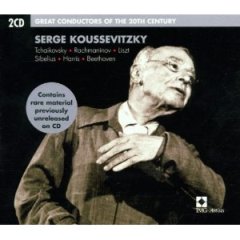Great Conductors of the 20th Century Vol.10 - Serge Koussevitzky
Great Conductors of the 20th Century Vol.10 - Serge Koussevitzky

CD1 Tchaikovsky / Symphony No.5 In E Minor, Op.64 1. I Andante Allegro con anima (15:19) 2. II Andante cantabile Con alcuna licenza (13:50) 3. III Valse Allegro moderato (06:18) 4. IV Finale Andante maestoso Allegro vivace (11:57) 5. Rachmaninov / Symphonic Poem Op.29, The Isle of the Dead Op.29 (18:44) 6. Liszt / Mephisto Waltz No.1, S110 No.2 (11:23) Boston Symphony Orchestra (1-6) CD2 Sibelius / Symphony No.7 In C Major, Op.105 1. I Adagio (07:54) 2. II Vivacissimo Adagio (04:24) 3. III Allegro molto moderato Allegro moderato (03:40) 4. IV Vivace Presto Adagio Largamente molto Affettuoso (05:05) 5. Roy Harris / Symphony No.3 (In One Movement) (16:38) Beethoven / Symphony No.5 In C Minor, Op.67 "Fate" 6. I Allegro con brio (08:04) 7. II Andante con moto (10:45) 8. III Allegro (05:35) 9. IV Allegro (08:53) BBC Symphony Orchestra (1-4) Boston Symphony Orchestra (5) London Philharmonic Orchestra (6-9) Serge Koussevitzky - conductor
Koussevitzky is one of the few conductors in this series whose entire career consists of pre-LP recordings, many caught in antiquated sound. He was born in 1874, the same year as Pierre Monteux, but of the two, not to mention Stokowski, Koussevitzky has survived as less well suited to modern taste. He had an impulsive conducitng style that changed tempo arbitrarily from bar to bar, and to modern ears this sounds too intrusive, even egotistical. During his long tenure with the Boston Sym. Koussevitzky commissioned more masterpieces (from Prokofiev, Stravinsky, Bartok, Copland, etc.) than anyone with the exception of Diaghalev, mostly financed with money from his rich wife.
I wish I could be more enthusiastic about how well this famous musician has lasted. All these recordings are in sketchy-to-good mono from the 30s and 40s. CD 1 begins with a virtuosic Tchaikovsky Fifth (1944) riddled with the condcutor's arbitrary phrasing--if you like Mengelberg, however, who was even more extreme, Koussevitzky's impassioned account may strike you as something special. The performance of Rachmaninov's Isle of the Dead (1945) is much better--feverish and moody wihtout the usual depressing langours one often hears in this piece. I would rate this a genuinely great recording. The sonics are among the best here, also. CD 1 ends with Liszt's excitingly trashy Mephisto Waltz (1936) in a romping, unbuttoned, and often wayward account caught in reasonably good sound--but who cares?
CD 2 begins with the Sym. #7 of Sibelius, one of Koussevitzsky's best composers. It's in boxy 1933 sound with the BBC Symphony and yet fairly leaps out of the speakers. Sibelius's rhapsodic idiom takes well to the cnductor's moment-to-moment mood changes. Too bad we can't hear it better. Koussevitzky's BSO commisions are represented by the Roy Harris Third Sym. (1939) in an often-reissued world premiere recoding. The sound is decrepit, and the reading, though extroverted, pales beside Leonard Bernstein's famous stereo version from the Sixties. The biggest misstep on the compliers' part, however, is a Beethoven Fifth with the London Phil. (1934), which is in pointlessly dim sound. Like Stokowski, one appreciates Koussevitzky outside the main German repertoire; we should have had more BSO recordings from the orchestra's golden age rather than this fairly routine, if vigorous, reading. --- Santa Fe Listener, amazon.com
download:








